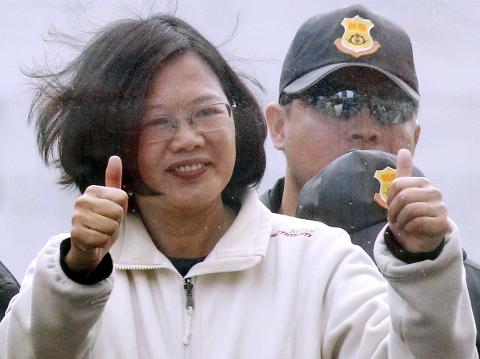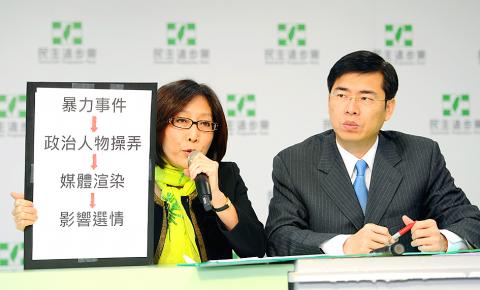The Democratic Progressive Party (DPP) yesterday warned of prevalent vote buying in central and southern Taiwan and the possibility of election-eve incidents today, urging authorities to step up investigations and security measures.
While voter turnout is regarded as one of the three key factors in the outcome of tomorrow’s presidential and legislative elections, vote buying and possible incidents pose greater concern, DPP spokesperson Chen Chi-mai (陳其邁) told a press conference.
Media reports of suspected vote buying were alarming and worrisome, Chen said, citing the case of Chung Shao-ho (鍾紹和), the Chinese Nationalist Party’s (KMT) legislative candidate in Greater Kaohsiung’s First District.

Photo: Reuters
Chung’s 50 campaigners were investigated on Wednesday for allegedly buying votes for NT$500.
Vote buying appears to be widespread in central and southern Taiwan, which the KMT has designated “crucial constituencies,” Chen said, calling on the judiciary to be proactive in its investigations of the allegations in those regions.
DPP presidential candidate Tsai Ing-wen (蔡英文) also raised the issue on the campaign trail, saying in Taoyuan that there had been rumors of vote buying in which the presidential and the legislative elections were being “bundled.”

Photo: Chang Chia-ming, Taipei Times
“If the rumors are true, it would be heartbreaking. If votes can be bought ... if the presidency can be bought, that would be the biggest disgrace for Taiwan and the -saddest thing that could happen to our democracy,” Tsai said.
The DPP also expressed concern over possible incidents prior to election day that might have an impact on the polls, such as the shooting of Sean Lien (連勝文), a son of former KMT chairman Lien Chan (連戰), on the eve of the special municipality elections in November 2010.
The incident was regarded by many analysts and observers as a determining factor in the outcome of one of the hotly contested elections, in which the KMT won three of the five mayoral seats.
“The last thing we want to see is a repeat of the 2010 shooting incident,” DPP spokesperson Kang Yu-cheng (康裕成) said.
Kang urged the National Security Bureau, which is charged with protecting the candidates, to increase its security for candidates, their families and senior politicians.
She also called on the media to refrain from sensational reporting, which could rile voters and incite conflict if an incident does occur.

DAREDEVIL: Honnold said it had always been a dream of his to climb Taipei 101, while a Netflix producer said the skyscraper was ‘a real icon of this country’ US climber Alex Honnold yesterday took on Taiwan’s tallest building, becoming the first person to scale Taipei 101 without a rope, harness or safety net. Hundreds of spectators gathered at the base of the 101-story skyscraper to watch Honnold, 40, embark on his daredevil feat, which was also broadcast live on Netflix. Dressed in a red T-shirt and yellow custom-made climbing shoes, Honnold swiftly moved up the southeast face of the glass and steel building. At one point, he stepped onto a platform midway up to wave down at fans and onlookers who were taking photos. People watching from inside

A Vietnamese migrant worker yesterday won NT$12 million (US$379,627) on a Lunar New Year scratch card in Kaohsiung as part of Taiwan Lottery Co’s (台灣彩券) “NT$12 Million Grand Fortune” (1200萬大吉利) game. The man was the first top-prize winner of the new game launched on Jan. 6 to mark the Lunar New Year. Three Vietnamese migrant workers visited a Taiwan Lottery shop on Xinyue Street in Kaohsiung’s Gangshan District (崗山), a store representative said. The player bought multiple tickets and, after winning nothing, held the final lottery ticket in one hand and rubbed the store’s statue of the Maitreya Buddha’s belly with the other,

‘NATO-PLUS’: ‘Our strategic partners in the Indo-Pacific are facing increasing aggression by the Chinese Communist Party,’ US Representative Rob Wittman said The US House of Representatives on Monday released its version of the Consolidated Appropriations Act, which includes US$1.15 billion to support security cooperation with Taiwan. The omnibus act, covering US$1.2 trillion of spending, allocates US$1 billion for the Taiwan Security Cooperation Initiative, as well as US$150 million for the replacement of defense articles and reimbursement of defense services provided to Taiwan. The fund allocations were based on the US National Defense Authorization Act for fiscal 2026 that was passed by the US Congress last month and authorized up to US$1 billion to the US Defense Security Cooperation Agency in support of the

‘COMMITTED TO DETERRENCE’: Washington would stand by its allies, but it can only help as much as countries help themselves, Raymond Greene said The US is committed to deterrence in the first island chain, but it should not bear the burden alone, as “freedom is not free,” American Institute in Taiwan Director Raymond Greene said in a speech at the Institute for National Defense and Security Research’s “Strengthening Resilience: Defense as the Engine of Development” seminar in Taipei yesterday. In the speech, titled “Investing Together and a Secure and Prosperous Future,” Greene highlighted the contributions of US President Donald Trump’s administration to Taiwan’s defense efforts, including the establishment of supply chains for drones and autonomous systems, offers of security assistance and the expansion of